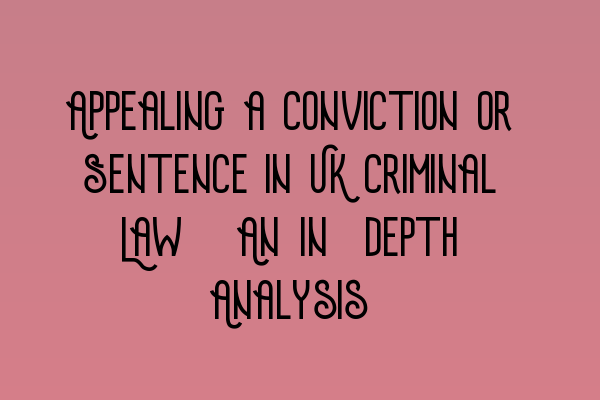Appealing a Conviction or Sentence in UK Criminal Law: An In-depth Analysis
Being convicted of a crime can have severe consequences on various aspects of your life. However, if you believe that the conviction or the sentence imposed on you is unjust, you have the right to appeal. In this blog post, we will comprehensively analyze the appeal process in UK criminal law, giving you the information you need to navigate this complex legal terrain.
The Grounds for Appeal
Before initiating an appeal, it is crucial to understand the grounds on which you can appeal a conviction or sentence. The most common grounds include:
- Errors in law – If the judge or jury made a legal error during the trial, it may provide grounds for appeal. This could include incorrect application of the law, misdirection of the jury, or the inclusion of inadmissible evidence.
- New evidence – If new evidence emerges after the trial that could potentially alter the outcome, it may be possible to appeal based on this ground. However, it is important to note that the new evidence must be significant and capable of affecting the original verdict.
- Procedural irregularities – If there were procedural irregularities during the trial that contributed to an unfair outcome, it may be possible to appeal. This could include issues such as inadequate legal representation, jury bias, or prosecutorial misconduct.
If you believe that any of these grounds apply to your case, it is advisable to consult with a qualified criminal law solicitor who specializes in appeals.
The Appeal Process
The appeal process in UK criminal law is conducted in a hierarchical manner. The first step is usually to appeal to the Crown Court, which acts as the appellate court for cases that were initially tried in the Magistrates’ Court. Upon receiving the appeal, the Crown Court will review the case and determine whether there are sufficient grounds to proceed with the appeal.
If the appeal is allowed, it will be scheduled for a hearing in the Crown Court. During the appeal hearing, both parties will present their arguments, and the court will consider the evidence and legal submissions afresh. The Crown Court has the power to quash the conviction or sentence, uphold the decision, or order a retrial.
If the appeal is unsuccessful at the Crown Court level, it may be possible to further appeal to the Court of Appeal. The Court of Appeal will review the case on the basis of the papers submitted by the parties and any additional oral arguments. Similar to the Crown Court, the Court of Appeal has the power to quash the conviction or sentence, uphold the decision, or order a retrial.
It is important to note that there are strict time limitations for filing appeals, so it is crucial to act promptly and seek legal advice as soon as possible.
Conclusion
Appealing a conviction or sentence in UK criminal law is a complex process that requires a deep understanding of the legal framework and grounds for appeal. If you believe that your conviction or sentence is unjust, it is essential to consult with a knowledgeable criminal law solicitor who can guide you through the appeal process and advocate for your rights.
For more information on related topics, you may find the following articles helpful:
- SQE 1 Practice Exam Questions
- SQE 1 Practice Mocks FLK1 FLK2
- SQE 2 Preparation Courses
- SQE 1 Preparation Courses
- SRA SQE Exam Dates
